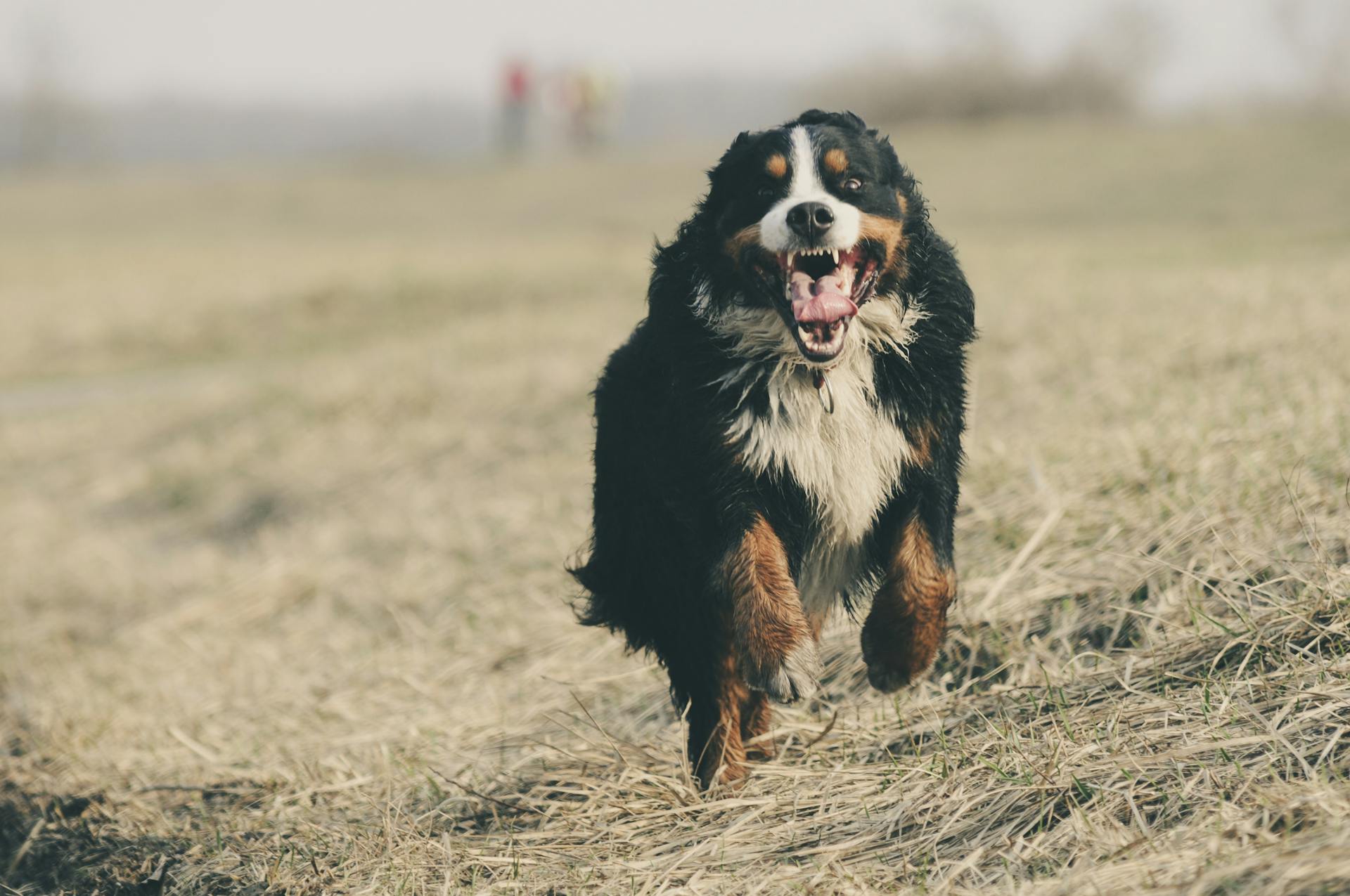
Bernese Mountain Dogs are a popular breed used as service dogs, known for their intelligence, loyalty, and gentle nature. They are naturally inclined to please their owners and are often used to assist individuals with disabilities.
Their calm temperament makes them an excellent choice for tasks that require a steady and composed demeanor. With proper training, they can thrive in a variety of roles, from guiding the visually impaired to providing emotional support.
One of the key advantages of using a Bernese Mountain Dog as a service dog is their ability to learn quickly and adapt to new situations. Their intelligence and willingness to please make them highly trainable, allowing them to excel in a range of service dog tasks.
In terms of physical demands, Bernese Mountain Dogs are a sturdy breed that can withstand regular exercise and activity. They require daily walks and playtime, but their build and temperament make them well-suited to a variety of living situations.
Bernese Mountain Dog Basics
Bernese Mountain Dogs are majestic-looking dogs with a long, thick, three-color coat and a large frame. They can weigh up to 115 pounds and stand 25 to 27 inches at the shoulder.
Their coat is jet black with white and rust highlights on the face, legs, chest, and tail. This gives them a warm and friendly face, despite their imposing size.
Males typically weigh more than females, with males weighing up to 115 pounds and females weighing up to 95 pounds.
Bernese Mountain Dog Size and Breeds
The Bernese Mountain Dog is a large breed, with males weighing anywhere between 80 to 115 pounds and females weighing 70 to 95 pounds at full development.
Their size can make them appear intimidating, but their gentle nature and loving personalities make them a great companion.
On average, Bernese Mountain Dogs grow to be between 23 to 27 inches tall, with males typically standing 25 to 27 inches at the shoulder and females ranging from 23 to 26 inches.
Bernedoodle Size
Bernedoodles come in a variety of sizes, including standard, mini, and tiny. They're a crossbreed with either the standard, mini, or toy poodle.
Standard Bernedoodles typically weigh between 70 to 90 pounds when fully grown.
Mini Bernedoodles range from 15 to 40 pounds as adults.
Tiny Bernedoodles are 10 to 20 pounds when fully developed.
The size of a Bernedoodle can vary depending on the size of the poodle used in the crossbreeding.
Broaden your view: When to Neuter Bernese Mountain Dog
Sizes of Sub-Breeds
The Bernese Mountain Dog comes in a range of sizes, but the average height for males is 24-28 inches.
Males typically weigh between 80-120 pounds, while females weigh between 65-100 pounds.
Some Bernese Mountain Dog sub-breeds can be smaller, like the Bernese Cattle Dog, which is a smaller version of the breed.
The average weight for a male Bernese Cattle Dog is around 60-80 pounds, making them a great option for families with smaller living spaces.
The larger sub-breeds, such as the Bernese Mountain Dog, can grow up to 28 inches tall and weigh over 120 pounds.
This size difference is a key factor to consider when choosing a Bernese Mountain Dog sub-breed, as it can affect their exercise needs and living arrangements.
Dog Breeds
The Bernese mountain dog's origin is undocumented, but it may be a descendant of a Roman mastiff and a Swiss flock-guarding dog. This unique heritage likely contributes to their distinctive appearance and temperament.
The Bernese mountain dog's size is a notable characteristic. They typically weigh between 80 and 120 pounds and stand between 23 and 27.5 inches tall at the shoulder.
Dogs' Temperament
Bernese Mountain Dogs are known to be super sweet and natural people pleasers. They're friendly with people and other animals, making them a great addition to families with multiple pets.
These dogs thrive on activity, training, and socialization, so be prepared to give them plenty of attention and exercise. They're open to strangers and only moderately protective.
Berners are playful and easygoing, but they can be big and exuberant, so they're not always a good match for babies or frail adults. They're also very large dogs who consider themselves lapdogs and want to be involved in every aspect of your day.
Berners are totally committed to their owners and love to be woven into the fabric of their family. They have a strong attachment to their people, but they can also be especially attached to one member of the family.
Some Berners even have quirky habits, like carrying a shoe in their mouth for comfort. They seem to enjoy human laughter and will repeat actions that elicit laughs in hopes of generating more.
Bernese Mountain Dog Health and Nutrition
Maintaining a healthy weight is crucial for your Berner's long-term health, as extra weight puts additional stress on their joints, metabolism, and heart.
A diet of fresh food is more digestible than processed kibble, promoting a healthy gut and improved digestion, which means better, smaller poops.
To ensure proper nutrition, control meal portions and calorie intake, and consider a fresh-food plan that takes into account your dog's age, size, and activity level.
On a similar theme: Bernese Mountain Dog Food Calculator
6-Month-Old Baby Size Expectations
At 6 months old, your Bernese mountain dog is probably getting pretty big. A fully grown Berner can weigh as much as 115 pounds.
Your 6-month-old Bernese mountain dog should be close to its adult size, but it's still got some growing to do. A fully grown Berner can weigh as much as 115 pounds.
You might be wondering how big your 6-month-old Bernese mountain dog should be. A fully grown Berner can weigh as much as 115 pounds.
It's essential to monitor your Bernese mountain dog's growth to ensure it reaches a healthy weight. A fully grown Berner can weigh as much as 115 pounds.
By 6 months, your Bernese mountain dog should have a good idea of its adult size. A fully grown Berner can weigh as much as 115 pounds.
Expand your knowledge: 6 Month English Mastiff
Berner Health Concerns
Bernese Mountain Dogs are prone to hip dysplasia, a condition where one or both hip joints become loose, causing limping, a swaying gait, and weakening of the leg muscles.
Check this out: Hip Dysplasia Bernese Mountain Dog
Hip dysplasia can be managed with pain medications, joint supplements, steroids, acupuncture, physical therapy, laser therapy, or surgery, depending on the severity of the condition.
Elbow dysplasia is another genetic condition that affects Bernese Mountain Dogs, causing limping, a stiff gait, pain, and weakening of the muscles.
Elbow dysplasia can be treated with surgery or medical management, which may include managing arthritis through a healthy weight, low-impact activities, physical therapy, joint supplements, and anti-inflammatory medications.
Some Bernese Mountain Dogs may be born with Von Willebrand's disease, a genetic disorder that decreases the activity of blood-clot forming cells, leading to excessive bleeding.
Unfortunately, there's no treatment for Von Willebrand's disease, but a veterinarian may recommend a blood transfusion if your dog is severely bleeding.
Progressive retinal atrophy (PRA) is a genetic disease that causes the retina to deteriorate, leading to loss of vision.
Dogs with PRA may be hesitant to go out at night or refuse to enter a dark room, and while there's no treatment, providing extra light in dark spaces and maintaining a consistent routine can help.
Broaden your view: Dark Rhodesian Ridgeback
Gastric dilatation and volvulus (GDV), also known as bloat, is a life-threatening condition where a dog's stomach fills with air and twists on itself, causing abdominal pain, lethargy, decreased appetite, retching, weakness, and collapsing.
If your Bernese Mountain Dog experiences these symptoms, seek veterinary attention immediately, as surgery followed by thorough nursing care is typically the recommended treatment option.
Food and Nutrition
Bernese Mountain Dogs need a diet that supplies enough energy for daily activities and helps them maintain a healthy weight.
A healthy weight is crucial for your Berner's long-term health, as it can positively influence major health concerns like hip dysplasia and hypothyroidism.
Keeping your Berner at a healthy weight means controlling meal portions and calorie intake while ensuring proper nutrition.
A fresh-food plan can make weight management more straightforward by providing the right amount of food for your dog's age, size, and activity level.
A diet of fresh food can be more digestible than processed kibble, promoting a healthy gut and improved digestion.
Better digestion means smaller, healthier poops, which is a win-win for both you and your Berner!
If this caught your attention, see: Healthy Bull Terrier
Frequently Asked Questions
Which dog makes the best service dog?
While any dog can be trained as a service dog, breeds like Labrador Retrievers, German Shepherds, and Golden Retrievers are often preferred due to their intelligence, loyalty, and calm temperament. These breeds can make excellent service dogs with proper training and socialization.
Can a Bernese Mountain Dog be a search and rescue dog?
Yes, Bernese Mountain Dogs can be trained for search and rescue due to their friendly nature and strong work ethic. They excel in roles that require a strong bond with people and animals.
Sources
- https://www.forbes.com/advisor/pet-insurance/pet-care/bernese-mountain-dog-size/
- https://www.dogbreedinfo.com/bernesemountain.htm
- https://www.thefarmersdog.com/digest/the-bernese-mountain-dog-breed-guide-personality-history-training-food-and-more/
- https://www.fetchpet.com/the-dig/bernese-mountain-dog
- https://romanreign.com/service-dog-prospects/
Featured Images: pexels.com


